Kids' TV Experiences
Comparisons are odious. Even so, EGB is very relevant to my children's TV experiences, even those that preceded it. Here are some thoughts on what were some of my favourite kids' TV shows (though my feelings may have changed), including attempts to make them just a little bit more interesting to EGB fans.
As far back as I can remember, Jake had a forever favourite in CITV's fantasy game show Knightmare. I, however, didn't love any TV show as much as that. How was I to know that EGB was out there in the ether, just waiting to be made, and this was the reason for the hole in my heart?
See also: Jake's TV Experiences.
As far back as I can remember, Jake had a forever favourite in CITV's fantasy game show Knightmare. I, however, didn't love any TV show as much as that. How was I to know that EGB was out there in the ether, just waiting to be made, and this was the reason for the hole in my heart?
See also: Jake's TV Experiences.
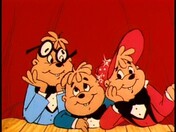 © Bagdasarian Productions, 1983
© Bagdasarian Productions, 1983
Alvin and the Chipmunks (1983-1990)
While I was waiting for EGB, I settled on Alvin and the Chipmunks as my favourite for a while. Part of its appeal was that Jake didn't seem to like it very much, and that made it mine! The show started before I was born, and episodes old and new were shown on Children's BBC throughout my childhood, which extended well into the years after the show ended. To begin with, I probably liked the funny voices and the songs. As I got older, I appreciated the plots and characterisation more, whether I was watching the Chipmunks or the Chipettes or – best of all – both trios of singing siblings together. I loved Alvin. When I was a child, he of course made me laugh, and perhaps I wished I could find some of his courage and confidence within myself. Today I love Alvin still, whether I'm watching him in the show I grew up with (and therefore the incarnation closest to my heart), the original '60s classic The Alvin Show (though this is rare), or the live action/CGI movies (a pleasant surprise, at least to begin with).
While I was waiting for EGB, I settled on Alvin and the Chipmunks as my favourite for a while. Part of its appeal was that Jake didn't seem to like it very much, and that made it mine! The show started before I was born, and episodes old and new were shown on Children's BBC throughout my childhood, which extended well into the years after the show ended. To begin with, I probably liked the funny voices and the songs. As I got older, I appreciated the plots and characterisation more, whether I was watching the Chipmunks or the Chipettes or – best of all – both trios of singing siblings together. I loved Alvin. When I was a child, he of course made me laugh, and perhaps I wished I could find some of his courage and confidence within myself. Today I love Alvin still, whether I'm watching him in the show I grew up with (and therefore the incarnation closest to my heart), the original '60s classic The Alvin Show (though this is rare), or the live action/CGI movies (a pleasant surprise, at least to begin with).
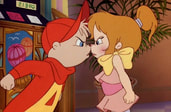 © Bagdasarian Productions, 1987
© Bagdasarian Productions, 1987
EGB Comparison
Alvin and Brittany were the first couple I ever shipped. Like Eduardo and Kylie, they have a volatile love/hate relationship which, unlike some, works. I must have been very young, and possibly I didn't get all the subtleties, but I remember enjoying their dynamic and getting warm fuzzies when they showed affection for each other. The show had a healthy mix of plot-driven and character-driven episodes, certainly less subtle and sophisticated than EGB, but even so the characterisation could be pretty meaty and explored relationships between siblings, friends, children/guardians and some-day lovers.
Alvin and Brittany were the first couple I ever shipped. Like Eduardo and Kylie, they have a volatile love/hate relationship which, unlike some, works. I must have been very young, and possibly I didn't get all the subtleties, but I remember enjoying their dynamic and getting warm fuzzies when they showed affection for each other. The show had a healthy mix of plot-driven and character-driven episodes, certainly less subtle and sophisticated than EGB, but even so the characterisation could be pretty meaty and explored relationships between siblings, friends, children/guardians and some-day lovers.
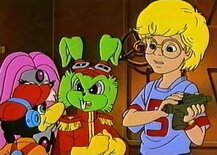 © Sunbow Productions, 1991
© Sunbow Productions, 1991
Bucky O'Hare and the Toad Wars (1991-1992)
I have no idea why I decided to sit down and watch this show one day in the early '90s; most probably, I was just watching CBBC because I had nothing better to do. Whatever the reason, I'm glad. I don't have a clear memory of my first Bucky O'Hare experience; all I can say is that I liked the show, and at some point I began to think that maybe I had at last found The One. It was certainly a worthy favourite before EGB came along. Only thirteen episodes of Bucky O'Hare were ever made, and there's plenty in them for my adult self to enjoy: sophisticated plots, clever writing, interesting characters and such marvellous satire. The Aniverse, populated by anthropomorphic animals in the midst of war (pretty much everyone vs. the toads, a race under the control of a megalomaniacal computer), holds up so many mirrors to our own world. We are the toads; we are the mammalian bureaucrats; a few of us may be noble enough to be represented in the heroes on the indisputable side of right; too many are unfortunate enough to be seen in the oppressed. I doubt I would have spotted all that as a child, yet something made me like this show more than others of a similar genre such as Bravestarr and Thundercats (both of which we watched). Bucky O'Hare was certainly action-packed, and I've always loved animals. Perhaps for me the human character, child genius Willy DuWitt whose science fair project turned out to be a transdimensional portal, fulfilled his role of grounding the show in (my) reality. I didn't notice, until I got the DVD years later, that there was yet more subtlety to enjoy in Willy being a fish out of water back home in San Francisco, but fitting in perfectly aboard Captain Bucky O'Hare's spaceship the Righteous Indignation. As a child, I chose Deadeye Duck as my favourite character, perhaps influenced by a cartoon duck precedent (Daffy and Count Duckula, but not Donald, I do not like him!); I must have liked Deadeye being an ex-pirate as well. Years later, I haven't changed my mind; he's still my favourite. He's at least as noble as his comrades, having left the pirate life to fight the toads, but he still has an edge to his moral character that the other good guys lack.
I have no idea why I decided to sit down and watch this show one day in the early '90s; most probably, I was just watching CBBC because I had nothing better to do. Whatever the reason, I'm glad. I don't have a clear memory of my first Bucky O'Hare experience; all I can say is that I liked the show, and at some point I began to think that maybe I had at last found The One. It was certainly a worthy favourite before EGB came along. Only thirteen episodes of Bucky O'Hare were ever made, and there's plenty in them for my adult self to enjoy: sophisticated plots, clever writing, interesting characters and such marvellous satire. The Aniverse, populated by anthropomorphic animals in the midst of war (pretty much everyone vs. the toads, a race under the control of a megalomaniacal computer), holds up so many mirrors to our own world. We are the toads; we are the mammalian bureaucrats; a few of us may be noble enough to be represented in the heroes on the indisputable side of right; too many are unfortunate enough to be seen in the oppressed. I doubt I would have spotted all that as a child, yet something made me like this show more than others of a similar genre such as Bravestarr and Thundercats (both of which we watched). Bucky O'Hare was certainly action-packed, and I've always loved animals. Perhaps for me the human character, child genius Willy DuWitt whose science fair project turned out to be a transdimensional portal, fulfilled his role of grounding the show in (my) reality. I didn't notice, until I got the DVD years later, that there was yet more subtlety to enjoy in Willy being a fish out of water back home in San Francisco, but fitting in perfectly aboard Captain Bucky O'Hare's spaceship the Righteous Indignation. As a child, I chose Deadeye Duck as my favourite character, perhaps influenced by a cartoon duck precedent (Daffy and Count Duckula, but not Donald, I do not like him!); I must have liked Deadeye being an ex-pirate as well. Years later, I haven't changed my mind; he's still my favourite. He's at least as noble as his comrades, having left the pirate life to fight the toads, but he still has an edge to his moral character that the other good guys lack.
 © Sunbow Productions, 1991
© Sunbow Productions, 1991
EGB Comparison
For me, Bucky O'Hare is more plot-driven than character-driven, and I can't really get my teeth into any relationships, except possibly Deadeye's friendship with Willy. As such, it's very different to EGB. I can only think of tentative comparisons, such as the sci-fi genre and the disappointing last episode. While 'Witchy Woman' was randomly tacked onto the end of EGB, 'The Taking of Pilot Jenny' was actually made as the Bucky O'Hare season finale, intended to be epic and exciting, but it's mostly just a toy catalogue. I suppose EGB is also a little guilty of shoehorning in potential merchandise i.e. fancy equipment. Just a little, though!
For me, Bucky O'Hare is more plot-driven than character-driven, and I can't really get my teeth into any relationships, except possibly Deadeye's friendship with Willy. As such, it's very different to EGB. I can only think of tentative comparisons, such as the sci-fi genre and the disappointing last episode. While 'Witchy Woman' was randomly tacked onto the end of EGB, 'The Taking of Pilot Jenny' was actually made as the Bucky O'Hare season finale, intended to be epic and exciting, but it's mostly just a toy catalogue. I suppose EGB is also a little guilty of shoehorning in potential merchandise i.e. fancy equipment. Just a little, though!
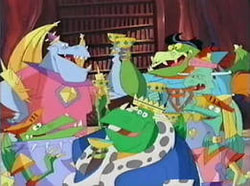 © Nelvana, 1996
© Nelvana, 1996
Blazing Dragons (1996-1998)
Just before EGB there came this little gem, a cartoon series based on a fun and imaginative computer game of the same name devised by Monty Python's Terry Jones. I don't know much about the computer game (though I did once watch a play-through on YouTube out of interest), but I could tell you many things about the TV series. In fact, if you think you'd like that, you can take a look at Jake's and my Blazing Dragons website (designed and built by me, with several contributions from both of us). Briefly, the show is a parody of Arthurian legend, following King Allfire and his Knights of the Square Table, all of them dragons occupying the castle of Camelhot. At the heart of the narrative is Flicker, the inept Sir Loungelot's clever and competent squire, who does all the work for no thanks and dreams of someday becoming a knight himself. He is in love with Princess Flame, and she with him. The series always seemed as though it were building up to Flicker being recognised as a hero, knighted and married to Flame. More on that later. The combination of these compelling, heart-warming storylines, whacky characters and out-there humour made this show a highlight of the week... for its first series, anyway.
Just before EGB there came this little gem, a cartoon series based on a fun and imaginative computer game of the same name devised by Monty Python's Terry Jones. I don't know much about the computer game (though I did once watch a play-through on YouTube out of interest), but I could tell you many things about the TV series. In fact, if you think you'd like that, you can take a look at Jake's and my Blazing Dragons website (designed and built by me, with several contributions from both of us). Briefly, the show is a parody of Arthurian legend, following King Allfire and his Knights of the Square Table, all of them dragons occupying the castle of Camelhot. At the heart of the narrative is Flicker, the inept Sir Loungelot's clever and competent squire, who does all the work for no thanks and dreams of someday becoming a knight himself. He is in love with Princess Flame, and she with him. The series always seemed as though it were building up to Flicker being recognised as a hero, knighted and married to Flame. More on that later. The combination of these compelling, heart-warming storylines, whacky characters and out-there humour made this show a highlight of the week... for its first series, anyway.
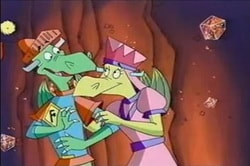 © Nelvana, 1996
© Nelvana, 1996
EGB Comparison
As I have just implied, like Bucky O'Hare before it and EGB after it, this show had a disappointing ending; in fact it had a disappointing entire second series, which suffered from dumbing-down (as some say happened to RGB). The unique thing that Blazing Dragons has in common with EGB is that it inspired me enough to create a fan site; that site, in fact, is older than this. It was created because I had been feeling the absence of a Blazing Dragons fan site and, by extension, our virtual season was written in order to tie up those loose ends that were so frustrating. Though I'd have liked to see a decent second series of EGB (i.e. one put together by the good writers, with the door firmly closed on the crappy ones), I wouldn't say it had any loose ends, as I've never thought it likely Eduardo and Kylie's ship would have been resolved on-screen. Flicker and Flame's, however, seemed like it would be. They are the subject of my first ever Shippers' Page; Kylie and Eduardo are the subject of my second (and last!). The two relationships are very different, with Flicker and Flame being comfortable with their feelings and their only obstacle being a class divide, whereas Eduardo and Kylie of course have more of an Alvin and Brittany vibe going on.
As I have just implied, like Bucky O'Hare before it and EGB after it, this show had a disappointing ending; in fact it had a disappointing entire second series, which suffered from dumbing-down (as some say happened to RGB). The unique thing that Blazing Dragons has in common with EGB is that it inspired me enough to create a fan site; that site, in fact, is older than this. It was created because I had been feeling the absence of a Blazing Dragons fan site and, by extension, our virtual season was written in order to tie up those loose ends that were so frustrating. Though I'd have liked to see a decent second series of EGB (i.e. one put together by the good writers, with the door firmly closed on the crappy ones), I wouldn't say it had any loose ends, as I've never thought it likely Eduardo and Kylie's ship would have been resolved on-screen. Flicker and Flame's, however, seemed like it would be. They are the subject of my first ever Shippers' Page; Kylie and Eduardo are the subject of my second (and last!). The two relationships are very different, with Flicker and Flame being comfortable with their feelings and their only obstacle being a class divide, whereas Eduardo and Kylie of course have more of an Alvin and Brittany vibe going on.
 © Finishing the Hat, 1996
© Finishing the Hat, 1996
Sabrina the Teenage Witch (1996-2003)
This show was contemporaneous with EGB, and then outlived it by some years. I was growing up, and didn't watch as many kids' shows as I used to (particularly post-EGB), but I did get into Sabrina. I had quite enjoyed Melissa Joan Hart in Clarissa Explains It All, and this was ten times better, because I'd always been interested in witches. The show was fun and gently amusing, and combined traditional witch lore with modern life in a way that I found deeply satisfying. My favourite character is Salem Saberhagen, the megalomaniac witch transformed into a cat as punishment for trying to take over the world. Salem knows every trick in the book, and some of my favourite episodes are those in which his advice and/or mischievous ways get Sabrina into trouble. The show went through some changes as writers reached for ideas, Sabrina got older and the production team changed. These days, I feel very positive about the peaks and very negative about the troughs; overall, the show remains a solid favourite.
This show was contemporaneous with EGB, and then outlived it by some years. I was growing up, and didn't watch as many kids' shows as I used to (particularly post-EGB), but I did get into Sabrina. I had quite enjoyed Melissa Joan Hart in Clarissa Explains It All, and this was ten times better, because I'd always been interested in witches. The show was fun and gently amusing, and combined traditional witch lore with modern life in a way that I found deeply satisfying. My favourite character is Salem Saberhagen, the megalomaniac witch transformed into a cat as punishment for trying to take over the world. Salem knows every trick in the book, and some of my favourite episodes are those in which his advice and/or mischievous ways get Sabrina into trouble. The show went through some changes as writers reached for ideas, Sabrina got older and the production team changed. These days, I feel very positive about the peaks and very negative about the troughs; overall, the show remains a solid favourite.
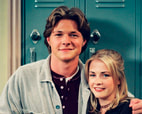 © Finishing the Hat, 1996
© Finishing the Hat, 1996
EGB Comparison
Of course Sabrina is of the fantasy genre, falling firmly on the unscientific magical side, whereas EGB is very much sci-fi as well. Both shows feature a cat, which is always a plus for me and, despite his non-magical origins, Pagan's body is at one time occupied by someone who longs to be human again (Eduardo in 'Be Careful What You Wish For'), as does Salem, although the circumstances are very different. I was, and still am (especially since I got the DVDs) a Sabrina and Harvey shipper, although this one certainly isn't love/hate: it is two people making a connection and forming a friendship, which leads to romantic love. Tara Charendoff (as she was then, and when voicing Kylie) features in a Halloween episode as the voice of the scary 'Molly Dolly', and in TV movies Sabrina Goes to Rome and Sabrina Down Under as Gwen, another teenage witch for Sabrina to hang out with (but I've only seen one of those and didn't like it... total waste of Tara!). Jenna Leigh Green, who stars as bitchy cheerleader Libby in the first three seasons of Sabrina, lends her voice to two episodes of EGB... though not good ones, sadly, despite Jenna's stellar efforts. She guest stars as Persephonetheus in 'Mole People', and as Wanda in 'Witchy Woman'.
Of course Sabrina is of the fantasy genre, falling firmly on the unscientific magical side, whereas EGB is very much sci-fi as well. Both shows feature a cat, which is always a plus for me and, despite his non-magical origins, Pagan's body is at one time occupied by someone who longs to be human again (Eduardo in 'Be Careful What You Wish For'), as does Salem, although the circumstances are very different. I was, and still am (especially since I got the DVDs) a Sabrina and Harvey shipper, although this one certainly isn't love/hate: it is two people making a connection and forming a friendship, which leads to romantic love. Tara Charendoff (as she was then, and when voicing Kylie) features in a Halloween episode as the voice of the scary 'Molly Dolly', and in TV movies Sabrina Goes to Rome and Sabrina Down Under as Gwen, another teenage witch for Sabrina to hang out with (but I've only seen one of those and didn't like it... total waste of Tara!). Jenna Leigh Green, who stars as bitchy cheerleader Libby in the first three seasons of Sabrina, lends her voice to two episodes of EGB... though not good ones, sadly, despite Jenna's stellar efforts. She guest stars as Persephonetheus in 'Mole People', and as Wanda in 'Witchy Woman'.
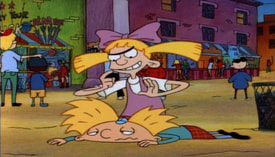 © Nickelodeon and Snee-Oosh Inc., 1996
© Nickelodeon and Snee-Oosh Inc., 1996
Hey Arnold! (1996-2004)
When I first gave Hey Arnold! a go, about a year before EGB came along, something about it made me think it might have the potential to be my favourite TV show. It started out as a fairly run-of-the-mill cartoon about a kid called Arnold kicking around with his contemporaries, trying to do the right thing and sometimes drifting off into bizarre fantasy sequences. These elements did not disappear (apart from the fantasy sequences), but they essentially became the backdrop over which a long, complex and compelling love story was played out. Helga Pataki was created as an antagonist, to annoy Arnold and disrupt his idealistic outlook; then none other than Lisa Groening, wife to Hey Arnold! creator Craig Bartlett and (as everyone knows) sister to The Simpsons creator Matt Groening, came up with the suggestion of Helga being secretly in love with Arnold. And what a suggestion! From there, Helga became a deeply emotional, complicated and even unbalanced character, who turned the notion of a 'toy ship' right on its head. These characters were supposed to be nine years old, yet Helga did such things as contrive to kiss Arnold in the school play and be rendered breathless by the result; keep a pair of Arnold's underpants in her Arnold shrine; watch him undress when she was in his bedroom trying to retrieve a talking parrot in possession of her secret and, in her love poetry, include such lines as 'You make my girlhood tremble'. In the meantime, she hid her true feelings beneath a façade of extraordinary aggression; this was often directed at Arnold, but no one was safe from her boiling-over emotions.
When I first gave Hey Arnold! a go, about a year before EGB came along, something about it made me think it might have the potential to be my favourite TV show. It started out as a fairly run-of-the-mill cartoon about a kid called Arnold kicking around with his contemporaries, trying to do the right thing and sometimes drifting off into bizarre fantasy sequences. These elements did not disappear (apart from the fantasy sequences), but they essentially became the backdrop over which a long, complex and compelling love story was played out. Helga Pataki was created as an antagonist, to annoy Arnold and disrupt his idealistic outlook; then none other than Lisa Groening, wife to Hey Arnold! creator Craig Bartlett and (as everyone knows) sister to The Simpsons creator Matt Groening, came up with the suggestion of Helga being secretly in love with Arnold. And what a suggestion! From there, Helga became a deeply emotional, complicated and even unbalanced character, who turned the notion of a 'toy ship' right on its head. These characters were supposed to be nine years old, yet Helga did such things as contrive to kiss Arnold in the school play and be rendered breathless by the result; keep a pair of Arnold's underpants in her Arnold shrine; watch him undress when she was in his bedroom trying to retrieve a talking parrot in possession of her secret and, in her love poetry, include such lines as 'You make my girlhood tremble'. In the meantime, she hid her true feelings beneath a façade of extraordinary aggression; this was often directed at Arnold, but no one was safe from her boiling-over emotions.
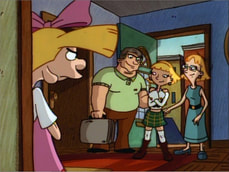 © Nickelodeon and Snee-Oosh Inc., 1996
© Nickelodeon and Snee-Oosh Inc., 1996
EGB Comparison
I shipped Arnold and Helga before, during and after Eduardo and Kylie's equally volatile romance was played out on-screen. Helga can be compared to Eduardo in many ways. Both hide their true feelings beneath a tough exterior, and both have some family issues, particularly where a considerably older sibling is concerned. Helga's relationship with her family is, for me, as compelling as her relationship with Arnold. Indeed, the two are not unrelated; her father, her mother and particularly her sister are all aspects of her life which Helga finds difficult, forcing her to look to her love for Arnold to sustain her emotional well-being. Her father isn't that interested in her; her mother's behaviour has led fans to believe she's an alcoholic (and I think they're right!); both adore their beautiful, clever, multi-award-winning older daughter Olga. Big Bob and Miriam Pataki are voiced by Maurice LaMarche and Katch Soucie; of course Kath wasn't in EGB while Maurice was, but some might think it interesting that these two were the voices of Egon and Janine for most of RGB's run. Unlike Carl Rivera, who never got the chance to come back after one season of EGB, Olga Pataki made several appearances over five seasons and made some interesting progress in her difficult relationship with her younger sibling. Helga also had some interesting episodes with both parents, best friend Phoebe and, of course, Arnold himself.
I shipped Arnold and Helga before, during and after Eduardo and Kylie's equally volatile romance was played out on-screen. Helga can be compared to Eduardo in many ways. Both hide their true feelings beneath a tough exterior, and both have some family issues, particularly where a considerably older sibling is concerned. Helga's relationship with her family is, for me, as compelling as her relationship with Arnold. Indeed, the two are not unrelated; her father, her mother and particularly her sister are all aspects of her life which Helga finds difficult, forcing her to look to her love for Arnold to sustain her emotional well-being. Her father isn't that interested in her; her mother's behaviour has led fans to believe she's an alcoholic (and I think they're right!); both adore their beautiful, clever, multi-award-winning older daughter Olga. Big Bob and Miriam Pataki are voiced by Maurice LaMarche and Katch Soucie; of course Kath wasn't in EGB while Maurice was, but some might think it interesting that these two were the voices of Egon and Janine for most of RGB's run. Unlike Carl Rivera, who never got the chance to come back after one season of EGB, Olga Pataki made several appearances over five seasons and made some interesting progress in her difficult relationship with her younger sibling. Helga also had some interesting episodes with both parents, best friend Phoebe and, of course, Arnold himself.
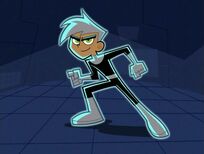 © Nickelodeon and Billionfold Inc., 2004
© Nickelodeon and Billionfold Inc., 2004
Danny Phantom (2004-2007)
I was a young adult of nineteen when this show started. I seem to remember I was channel-hopping one day; I found Danny Phantom, and the similarities to EGB compelled me to stay and watch. More on that later. Well, I got into it. I was mature and sensible enough to be watching childhood favourites again, and I was feeling negative about the quality of current children's cartoons (not knowing there was worse to come!). By comparison, I thought this one was well thought out, well written and well realised. The premise is this: Danny Fenton takes a look inside his eccentric scientist parents' 'Fenton Portal' and ends up with ghost powers; he uses these to fight ghosts, whilst coping with the everyday trials of being a teenager and keeping his powers a secret from all but his best friends, Sam(antha) and Tucker, and later his sister Jazz. It's a classic formula (similar to Sabrina, among other things), though not always successful; I liked the way it was done here, with plenty of character development to get into. There was some compelling ongoing plot as well, and how wonderful that it was all finally resolved. My love affair with this show was particularly delightful for being so unexpected, and I very much suspect it will be my last with a kids' TV series. As such, Danny Phantom will always have a place in my heart.
I was a young adult of nineteen when this show started. I seem to remember I was channel-hopping one day; I found Danny Phantom, and the similarities to EGB compelled me to stay and watch. More on that later. Well, I got into it. I was mature and sensible enough to be watching childhood favourites again, and I was feeling negative about the quality of current children's cartoons (not knowing there was worse to come!). By comparison, I thought this one was well thought out, well written and well realised. The premise is this: Danny Fenton takes a look inside his eccentric scientist parents' 'Fenton Portal' and ends up with ghost powers; he uses these to fight ghosts, whilst coping with the everyday trials of being a teenager and keeping his powers a secret from all but his best friends, Sam(antha) and Tucker, and later his sister Jazz. It's a classic formula (similar to Sabrina, among other things), though not always successful; I liked the way it was done here, with plenty of character development to get into. There was some compelling ongoing plot as well, and how wonderful that it was all finally resolved. My love affair with this show was particularly delightful for being so unexpected, and I very much suspect it will be my last with a kids' TV series. As such, Danny Phantom will always have a place in my heart.
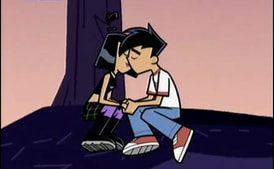 © Nickelodeon and Billionfold Inc., 2007
© Nickelodeon and Billionfold Inc., 2007
EGB Comparison
Here's an obvious similarity to EGB: this show's premise involves ghostbusting. Danny's 'Fenton Thermos' works very much like a ghost trap, and from it he transfers his captives into the Ghost Zone, which is not unlike the containment unit, even to the extent that it's kept in the basement (of the Fenton family home, in this case). There is a crucial difference, though: Danny's ghosts can get out again and become recurring antagonists. Danny Phantom has an in-universe explanation for the Bermuda Triangle disappearances, as does EGB, and some other episodes explore similar ideas as well; 'Frightmare', for instance, has a lot in common with EGB's 'In Your Dreams' (including at least one character dream for shippers to delight over, which links rather nicely to my next point). Both shows have a feisty Goth heroine; Sam being Goth was one of the first things I noticed when I found the show and decided to give it a try, as I was instantly reminded of Kylie. I quickly became a Danny and Sam shipper, enjoying the simplicity and purity of their friendship-turning-romance, which of course is different to what Eduardo and Kylie had going on (though not unlike Sabrina and Harvey). Tara Strong features in several episodes of Danny Phantom as magical-guitar-toting rock star ghost Ember, and as Star, empty-headed sidekick to the thoroughly unpleasant popular girl. The show even includes an actual reference to EGB! An episode entitled 'The Million Dollar Ghost' features a selection of one-off ghost hunters, including the 'Extreme Ghostbreakers': a boy/girl duo who ride quad bikes and such bearing the initials XGB, fight with gadgets (which are nothing like proton packs, ghost traps or PKE meters), and shout out sentences that include the adjective 'extreme'. Beyond the name, it really isn't a parody of the original (unlike the other guest ghost hunters: the 'Guys in White' and, more so, the 'Groovy Gang and Scaredy-Cat', complete with the bribe of a 'Kitty Krunch').
Here's an obvious similarity to EGB: this show's premise involves ghostbusting. Danny's 'Fenton Thermos' works very much like a ghost trap, and from it he transfers his captives into the Ghost Zone, which is not unlike the containment unit, even to the extent that it's kept in the basement (of the Fenton family home, in this case). There is a crucial difference, though: Danny's ghosts can get out again and become recurring antagonists. Danny Phantom has an in-universe explanation for the Bermuda Triangle disappearances, as does EGB, and some other episodes explore similar ideas as well; 'Frightmare', for instance, has a lot in common with EGB's 'In Your Dreams' (including at least one character dream for shippers to delight over, which links rather nicely to my next point). Both shows have a feisty Goth heroine; Sam being Goth was one of the first things I noticed when I found the show and decided to give it a try, as I was instantly reminded of Kylie. I quickly became a Danny and Sam shipper, enjoying the simplicity and purity of their friendship-turning-romance, which of course is different to what Eduardo and Kylie had going on (though not unlike Sabrina and Harvey). Tara Strong features in several episodes of Danny Phantom as magical-guitar-toting rock star ghost Ember, and as Star, empty-headed sidekick to the thoroughly unpleasant popular girl. The show even includes an actual reference to EGB! An episode entitled 'The Million Dollar Ghost' features a selection of one-off ghost hunters, including the 'Extreme Ghostbreakers': a boy/girl duo who ride quad bikes and such bearing the initials XGB, fight with gadgets (which are nothing like proton packs, ghost traps or PKE meters), and shout out sentences that include the adjective 'extreme'. Beyond the name, it really isn't a parody of the original (unlike the other guest ghost hunters: the 'Guys in White' and, more so, the 'Groovy Gang and Scaredy-Cat', complete with the bribe of a 'Kitty Krunch').

